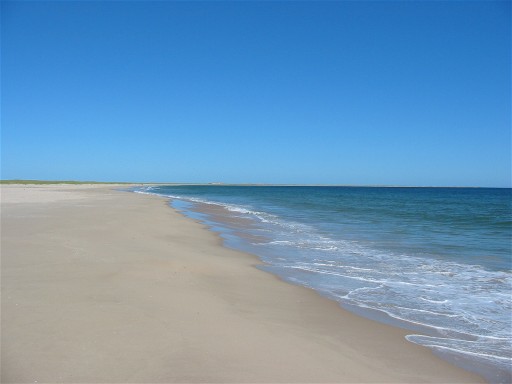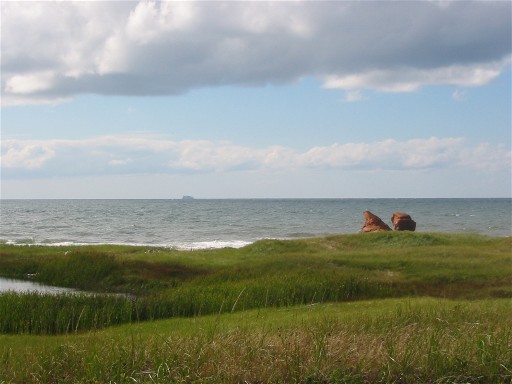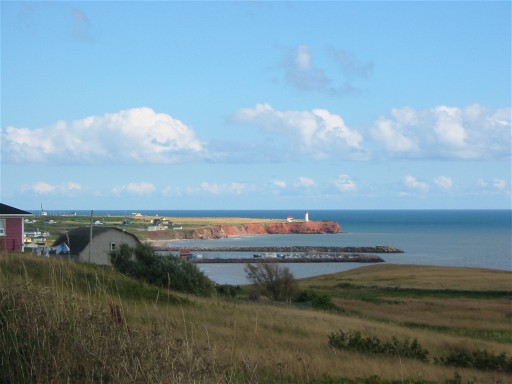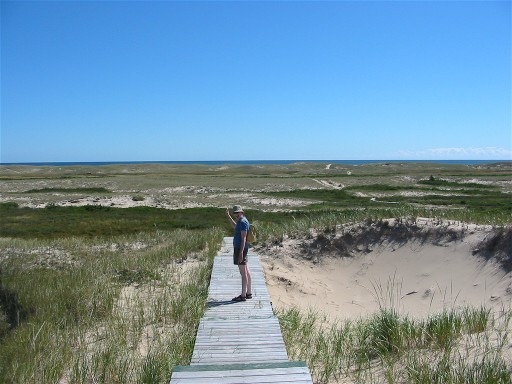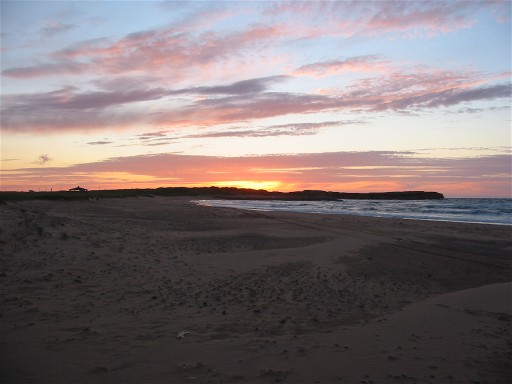« August 2005 | Main | October 2005 »
September 28, 2005
Really amazing
So many people cheapen the word "amazing" by using it to refer to merely outstanding or relatively impressive feats. Since the word has a unique usage, I therefore refrain from using it unless it really applies.
Which, I think you'll agree, it does here.
Posted by The Greatness at 12:46 PM | Comments (0)
September 15, 2005
Johnson, Lamoureux, and Asa Gray
I've been trying to catch up on my sundry evolution reading lately and have managed to finish two books. One was Darwiniana, a collection of essays by Asa Gray that was published in 1876. The other was Darwinism Defeated?: The Johnson-Lamoureux Debate on Biological Origins, which was published in 1999 and features Phillip E. Johnson and Denis O. Lamoureux. Both books are advanced treatises on evolution and its metaphilosophical brother "Darwinism" and whether they conflict with faith. You might think that over 100 years of new science and debate on the subject would have advanced the argument somewhat. Sadly, it is not the case.
Debate was occasioned by Lamoureux's decision to rebut Johnson's controversial bestseller Darwinism Defeated, the followup to Darwin on Trial (which I found beguiling yet weak on evidence, ironically enough). Johnson, a law professor at the University of California at Berkeley, has risen to a position of great importance in the popular community of faith by articulating two ideas: that naturalism, materialism, and Darwinism have been elevated to the status of untouchable religious dogma, to the detriment of Christianity and general morality; and that scientifically, evolution cannot account for the diversity of life and therefore an intelligent designer must have been behind it. These were not new ideas -- indeed, the latter is just Paley's nineteenth-century watchmaker argument -- but Johnson has been effective as the elder statesman for Intelligent Design, shepherding Michael Behe, William Dembski, Johnathan Wells, and their numerous book-writing colleagues.
Lamoureux, holder of PhD's in both evolutionary biology and theology, disputes both of these notions. Against the first, he points out several studies that show belief, even in a personal God who answers prayers, is still prevalent among leading scientists:
To be sure, during this century the biological theory of evolution has come to be the only paradigm for the origin of life in the scientific world. However ... it does not follow that to be an evolutionist one is necessarily a naturalist or materialist denying the existence of God, as Johnson constantly insists in his books. Rather it is reasonable to suggest that at least four out of ten scientists in the U.S. believe God created through a teleological evolutionary process ... Johnson is to be congratulated for pointing out blatant examples where materialism and naturalism are injudiciously expressed and imposed in certain sectors of our society. However, he overstates his case with regard to the pervasiveness of this philosophical view, and he is simply wrong in suggesting that materialism/naturalism is necessarily associated with the biological theory of evolution or that this dysteleological worldview is universally upheld by the modern scientific community. (italics in original)
Lamoureux also ably refutes many specific arguments under the second principle, demonstrating Johnson has not in any way refuted the scientific validity of evolution. Stunningly, Johnson's reply to Lamoureux entirely ignores this issue, except to say that
I doubt that the common ancestry thesis is true, at least at the higher levels (phyla) of the taxonomic hierarchy. However, I do not consider this issue to be of central importance and do not attempt to argue the question for now...
(Lamoureux's response, paraphrased: "But -- !!") No, Johnson may resort to scientific arguments, but they aren't really his main concern (or, many would say, his forte). He instead focuses his rhetorical guns on the teleological/dysteleological distinction Lamoureux insists upon:
Some of us find confirmation of this principle [Romans 1:20] in the nature of living organisms, which incorporate many highly complex systems whose nature seems to point to the need for a designer ... Darwinian evolutionary biologists insist that this appearance of design is an illusion, and that unguided material processes, particularly the accumulated changes through natural selection, have actually produced the wonders of the living world ... Christian methodological naturalists usually call themselves theistic evolutionists ... I have written that theistic evolution can more accurately be described as theistic naturalism. Is the evolutionary creationism of Denis Lamoureux different from what I have just described as theistic naturalism? It might seem so, because he endorses teleological evolution ... On closer examination, however, it appears that the 'teleology' part is entirely subjective and has no more scientific content than the 'theism' in theistic evolution. What exactly did God do (beyond establishing the laws at the beginning of time) and how do we know that he actually did it? (italics mine)
Here Johnson lays bare the crucial presupposition of the Intelligent Design movement: if God is involved, his presence must be scientifically discernible. Nothing, not even scientific stabs at evolution, is more important to ID than this credo, which in church circles they say is supported by Romans 1:20:
For since the creation of the world God's invisible qualities -- his eternal power and divine nature -- have been clearly seen, being understood from what has been made, so that men are without excuse. (NIV)
Lamoureux's second response to Johnson tracks to a surprising degree Asa Gray's rebuttal to the geologist J. William Dawson a century ago. It is not hard to imagine Drs. Dawson and Johnson (contra Gray and Lamoureux) enjoying each other's company a great deal. Says Gray:
The difficulty with Dr. Dawson here is (and it need not be underrated) that apparently he cannot as yet believe an adaptation, act, or result, to be purposed the apparatus of which is perfected or evolved in the course of nature -- a common but a crude state of mind on the part of those who believe that there is any originating purpose in the universe, and one which, we are sure, Dr. Dawson does not share as respects the material world until he reaches the organic kingdoms ... he warns those who "endeavor to steer a middle course, and to maintain that the Creator has proceeded by way of evolution," that "the bare, hard logic of Spencer, the greatest English authority on evolution ... excludes the knowledge of a Creator and the possibility of his work."
Now, this is a dangerous line to take. Those defenders of the faith are more zealous than wise who must needs fire away in their catapults the very bastions of the citadel, in the defense of outposts that have become untenable. It has been and always will be possible to take an atheistic view of Nature, but far more reasonable from science and philosophy only to take a theistic view ... It is the best, if not the only, hypothesis for the explanation of the facts.And elsewhere,
There are, perhaps, only three views of efficient cause which may claim to be both philosophical and theistic:... all three are philosophically compatible with design in Nature.
- The view of its exertion at the beginning of time, endowing matter and created things with forces which do the work and produce the phenomena.
- This same view, with the theory of insulated interpositions, or occasional direct action, engrafted upon it -- the view that events and operations in general go on in virtue simply of forces communicated at the first, but that now and then, and only now and then, the Deity puts his hand directly to the work.
- The theory of the immediate, orderly, and constant, however infinitely diversified, action of the intelligent efficient Cause.
Lamoureux takes Gray's first position in trying to show an unbroken chain of creation, while many in the theistic evolution community would be comfortable with the last position with God as "sustainer" of the universe. But ID proponents choose to take the middle position, characterizing the first as mere deism and the last as glib materialism with a political veneer of so-called theism. They yearn for a knock-down positive apologetic for God the creator, a smoking gun that they can victoriously taunt atheists with: "Ha! Show me how that could have come about without God!"
But Romans 1:20 never required that kind of proof. It says that the natural world, taken in its entirety, should compel us to accept that there must be a Power that caused Nature, however directly or indirectly: simply put, a cosmological argument, albeit one that affirms design. It doesn't say that we should have a schematic to bludgeon people into belief with. After all, the prophets of anti-religion (Richard Dawkins, Daniel Dennett, et al) hinge their argument against theism, not on the science per se, but on prosaic metaphysical arguments that they feel directly follow from it. Why should we expect such a stale positive apologetic for theism to be any less prosaic? More to the point, how could you possibly prove something in nature to have required special attention by the Creator?
The ID movement is on a mission to find such evidence, but it is an old errand imbued with futility, and better suited to Don Quixote than to Johnson and his band of credentialed worthies.
Posted by The Greatness at 01:42 PM | Comments (2)
September 12, 2005
J'adore les Iles!
The Sweetness and I went to the Magdalen Islands over Labor Day weekend. These little-known islands are situated south-centrally in the Gulf of St. Lawrence. But unlike South Central, they aren't dangerous -- unless you consider the French dangerous. The Iles-de-la-Madeleine belong to Quebec, ostensibly a province of Canada, and they are unlike anything else in the whole country. Highlights of the trip and pics below the fold...
This beach has been mentioned in National Geographic and hailed as one of the most beautiful, unspoiled beaches in the world. So where is everybody? It's a three-day weekend and nobody is here; maybe the five-hour ferry from Prince Edward Island scared 'em off. Oh well, it didn't bother us. Everybody else was on the water next to the massive dunes, windsurfing and kiteboarding and such.

The Magdalens confounded our expectations of finding sleepy, ramshackle fishing villages amongst the sand and the surf. Actually everything is tidy and well kept-up, suggesting that the lobstering must be mighty good. Or maybe it's the seal hunt. Or the herring being smoked in smokehouses like this one. Whatever it is, they're not poor cousins shut out from the world, that's clear!
Beautiful, isn't it? Explorer Jacques Cartier, who discovered the islands, said that 20 acres of the Magdalens were worth more than the whole of Newfoundland. I haven't been to The Rock, so I will reserve judgment. I see the Magdalens as a cross between PEI and the Outer Banks of North Carolina. Except, you know, French.
Posted by The Greatness at 01:00 PM | Comments (1)
